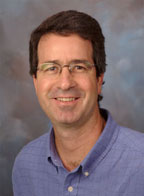- Profile Image

- Name
- Mitchell Denning
- Degree
- Ph.D.
- Rank
- Professor
- Primary Department
- Cancer Biology
- Hobbies
- Skiing
- Bicycling
- Summaries
- Non-melanoma skin cancers (basal and squamous cell carcinomas) are the most common type of human cancer. Dr. Denning's laboratory studies signaling pathways which regulate normal skin homeostasis to better understand how alterations in these signaling pathways contribute to malignancy. They are focusing on the involvement of the protein kinase C (PKC) family of enzymes in the multi-step transformation of human keratinocytes. PKC is a central regulator of the normal keratinocyte differentiation program, and alterations in epidermal differentiation and PKC signaling are evident in malignant keratinocytes as well as a large number of benign skin diseases. PKC is directly activated by phorbol ester tumor promoters commonly used in mouse skin chemical carcinogenesis studies. Dr. Denning's lab discovered that PKC is also activated by ultraviolet radiation, the main environmental carcinogen for human skin cancer formation. They are using a variety of cell biological, biochemical, pharmacological, and molecular genetic approaches to characterize the functional significance of PKC activation in normal and neoplastic keratinocytes. Their long-term goals are to target these signaling pathways for therapeutic or preventive interventions in skin cancer.
- Publications
- Zhang, L; Luo, H; Ni, HM; Liu, S; Xing, H; Zhang, J; Sellin, M; Breslin S J, P; Wei, W; Denning, MF; Small, W; Ding, WX; Huang, S; Zhang, J Ripk3 signaling regulates HSCs during stress and represses radiation-induced leukemia in mice. Stem cell reports ;
- Liu, S; Joshi, K; Denning, MF; Zhang, J RIPK3 signaling and its role in the pathogenesis of cancers. Cellular and molecular life sciences : CMLS ;
- Wang, H; Hou, W; Perera, A; Bettler, C; Beach, JR; Ding, X; Li, J; Denning, MF; Dhanarajan, A; Cotler, SJ; Joyce, C; Yin, J; Ahmed, F; Roberts, LR; Qiu, W Targeting EphA2 suppresses hepatocellular carcinoma initiation and progression by dual inhibition of JAK1/STAT3 and AKT signaling. Cell reports ; 34 8
- Wang, F; Hou, W; Chitsike, L; Xu, Y; Bettler, C; Perera, A; Bank, T; Cotler, SJ; Dhanarajan, A; Denning, MF; Ding, X; Breslin, P; Qiang, W; Li, J; Koleske, AJ; Qiu, W ABL1, Overexpressed in Hepatocellular Carcinomas, Regulates Expression of NOTCH1 and Promotes Development of Liver Tumors in Mice. Gastroenterology ; 159 1
- Wang, F; Bank, T; Malnassy, G; Arteaga, M; Shang, N; Dalheim, A; Ding, X; Cotler, SJ; Denning, MF; Nishimura, MI; Breslin, P; Qiu, W Inhibition of insulin-like growth factor 1 receptor enhances the efficacy of sorafenib in inhibiting hepatocellular carcinoma cell growth and survival. Hepatology communications ; 2 6
- Kim, JL; Ha, GH; Campo, L; Denning, MF; Patel, TB; Osipo, C; Lin, SY; Breuer, EK The role of Rak in the regulation of stability and function of BRCA1. Oncotarget ; 8 49
